
EU's visa-freedom dividing Balkans
Published on
The “European perspective” is key concept for integrating western Balkans into EU. The main carrot for ordinary people during this millennium has been visa-free travel after some 17 years of isolation. On 15th July 2009, the European Commission submitted its proposal on visa-free travel for citizens of Western Balkans countries.
After a non-binding opinion of the European parliament on the EC proposal the Council comprising EU interior ministers will take the official vote and at best case free travel to Schengen area could be possible January 2010.
But not for all! European perspective will be true only for some when visa ban still will be existing for some countries or even to some ethnic groups inside a country. Instead of connecting people of western Balkans with western Europe the EC proposal will divide again people according their nationality or location. From EU's side the reason for division is seen technical related to common standards; from western Balkan's perspective the reasons for division can be seen political or even related to religion.
The Schengen wall was erected against most of the Balkans during the early 1990s, when the breakup of former Yugoslavia created an image was ongoing and bloody wars were spreading from Croatia to Bosnia and Kosovo. Before breakup the citizens of Yugoslavia enjoyed relatively free travel possibilities if compared to rest of countries in central and eastern Europe. After visa ban and trade embarco only the most criminal elements found it easiest to evade the regulations.
EC proposal
Briefly of the five regional states involved in the visa-liberalisation process, Serbia, Macedonia, and Montenegro have been approved for visa-free travel within the EU, as of January 2010. Bosnia and Herzegovina and Albania have been told that they might receive EU visa-free status later. Kosovo, on the other hand, has not been included in the process, as five of the 27 members of the EU have not recognised Kosovo’s independence. (Source BalkanInsight )
An EU law (Council Regulation 539/2001) lists the countries whose nationals need a visa to enter the Schengen area (Schengen Black List) and those whose nationals do not (Schengen White List). The Commission proposes following:
visa-free travel for the citizens of Macedonia since this country has fulfilled all the conditions listed in the visa roadmap; technically, this should be done by moving Macedonia from the "black list" onto the "white list" annexed to the relevant Council Regulation; visa-free travel for the citizens of Serbia and Montenegro on condition that these two countries meet a few remaining conditions by the date of adoption of the proposal by EU member states; exclusion from visa-free regime for Serbia of holders of the new Serbian biometric passport who reside in Kosovo and persons whose citizenship certificate has been issued for Kosovo, due to "security concerns regarding in particular the potential for illegal migration from persons residing in Kosovo"; the new passport can be issued to Kosovo residents solely by the Coordination Directorate at the Interior Ministry of Serbia, which will make these passports recognisable; formalisation of the existing visa requirement for Kosovo residents by adding Kosovo (under UNSC Resolution 1244/99) to the black list, under the special category of "entities and territorial authorities that are not recognised as states by at least one member state" where the Palestinian Authority and Taiwan are already listed; no change of the status for Albania and Bosnia and Herzegovina, which remain on the black list since they have not fulfilled all conditions, but the Commission "intends to propose transferring them to the positive list as soon as they have fulfilled the necessary benchmarks".(Source and more information about "White list project" one may find from web-pages of European Stability Initiative – ESI – institute)
Divided rights in Bosnia-Herzegovina
 Bosnia-Herzegovina
is an international creature established by Dayton Agreement on 1995
which split Bosnia into two semi-independent entities – the Serb
Republic and the Muslim-Croat Federation. Three ethnic groups – Croats,
Serbs and Bosniaks – are trying to lead state together and separately.
Entities are united by weak central institutions, while at same time
administration is quite heavy loaded with some 170 ministers and whole
system is supervised by international presence.
Bosnia-Herzegovina
is an international creature established by Dayton Agreement on 1995
which split Bosnia into two semi-independent entities – the Serb
Republic and the Muslim-Croat Federation. Three ethnic groups – Croats,
Serbs and Bosniaks – are trying to lead state together and separately.
Entities are united by weak central institutions, while at same time
administration is quite heavy loaded with some 170 ministers and whole
system is supervised by international presence.
Most Bosnian Croats already have Croatian passports and since Republika Srpska residents can apply for and obtain Serbian passports, the EC proposal for Bosnia would affect the majority of Bosniaks and those Bosnian Serbs, Jews and others that live in the Muslim-Croat Federation. The EU's message now weakens already non-existent national identity and opposes EU's earlier multi-ethnic ideals.
While earlier dispute was between Serbs and Bosniaks, last year showed serious dissension between Bosniaks and Croats and EC proposal will make ethnic divisions deeper at time when Bosnia-Herzegovina is on the stage of transition from an international protectorate to one responsible for its own reform dynamics. So instead of an inevitable EU member, Bosnia is more likely to remain an unwelcome, dysfunctional and divided country, with an aggrieved Bosniak (Muslim) plurality, a frustrated, increasingly defensive Serb entity, and an anxious, existentially threatened Croat population. (More about Dayton and situation in BiH e.g. In My article “Bosnia Collapsing” )
Mess-up in Kosovo continues
 The
Kosovo case is dividing international community as well EU. EU started
its huge rule & law mission late 2008 under UN umbrella. Besides
UN/UNMIK and EU/EULEX there is also other players twisting arms who is
leading the international protectorate. There is European Union High
Representative who simultaneously leads International Community Office
wondering his role, same time Nato-troops (KFOR) tries to keep ethnic
tensions moderate, OSCE do not know its role nor length of its
mission’s mandate in Kosovo, EU delegation office, few influential
foreign liaison representatives and of course sc. Kosovo government
based to local tribes. It shows amazing creativity to establish this
kind organizational nightmare in one tiny province and more amazing is
that after nearly nine years of international administration and
capacity building and squandered billions of Euros both the
administration and the situation on the ground are beneath all
criticism.
The
Kosovo case is dividing international community as well EU. EU started
its huge rule & law mission late 2008 under UN umbrella. Besides
UN/UNMIK and EU/EULEX there is also other players twisting arms who is
leading the international protectorate. There is European Union High
Representative who simultaneously leads International Community Office
wondering his role, same time Nato-troops (KFOR) tries to keep ethnic
tensions moderate, OSCE do not know its role nor length of its
mission’s mandate in Kosovo, EU delegation office, few influential
foreign liaison representatives and of course sc. Kosovo government
based to local tribes. It shows amazing creativity to establish this
kind organizational nightmare in one tiny province and more amazing is
that after nearly nine years of international administration and
capacity building and squandered billions of Euros both the
administration and the situation on the ground are beneath all
criticism.
According the new report made by Minority Rights Group International (MRG) gives a bare picture about worsening situation of minority rights in today’s Kosovo. Instead to return to their homes after ethnic cleansing implemented by Kosovo Albanians after Nato intervention 1999 minorities are beginning to leave Kosovo, because they face exclusion and discrimination. This negative process is happening in international protectorate where EU is implementing one of its biggest civil crisis management operations and once again demonstrates the huge gap between high flown ideas, aims, programmes and statements made in Brussels and their implementation on the ground.
In the letter to the EU, the NGOs state that Kosovo`s exclusion from the visa-liberalisation process threatens to transform Kosovo "into a ghetto without any way out”. The head of the Club for Foreign Policy and co-signatory of the letter, Veton Surroi said that Kosovo's citizens would be further isolated by the EU’s decision, hindering the integration of the country.
“Today, one of the [factors] which impinge on the dignity of Kosovo’s citizens [...] is the issue of visas. Go to any embassy in Kosovo or in Skopje today and you will see how degrading the approach towards Kosovo’s citizens has become. And today we are worse off than we were 15-20 years ago”, Surroi said in a press conference on Tuesday. (Source BalkanInsight)
In line with the Commission's (visa-free) proposal, the 3.5 million Serbs living outside Serbia, including the Serbs of Bosnia, will be eligible to receive Serbian passports allowing visa-free travel within the EU. The residents of Kosovo, meanwhile, will not. The argument for discrimination is a follow-up of of administrative mess-up mentioned earlier. According EC proposal
“Since 1999 Serbia has not had the possibility to make on the spot verifications regarding persons residing in Kosovo under UNSCR 1244/99 ... the Commission and the Member States experts were not in a position to verify the issuing of breeder documents and the integrity and security of the procedures followed by the Serbian authorities for the verification of the correctness of data submitted by persons residing in Kosovo when applying for new Serbian biometric passports”.
So when EU and international have not implemented during last 10 years UN resolution the residents in international protectorate must suffer. From the bright side now the majority of former Kosovo Serbs can have visa-free travel abroad as they are residing in Serbia because they could not return to their homes in Kosovo after ethnic cleansing made by Kosovo Albanians on 1999 and 2004. (More about this topic e.g. in my article “Kosovo March/February 17th: Pogrom with Prize”)
Politics or standards
 For
one hand one can see some European hypocrisy towards the region as in
both cases – Bosnia-Herzegovina and Kosovo – EU and international
community have guided and supervised these regions towards “European
standards”. So has EU failed with this task as those countries without
outside supervision are getting visa-freedom earlier?
For
one hand one can see some European hypocrisy towards the region as in
both cases – Bosnia-Herzegovina and Kosovo – EU and international
community have guided and supervised these regions towards “European
standards”. So has EU failed with this task as those countries without
outside supervision are getting visa-freedom earlier?
There is also well based arguments that the EU is isolating three mainly Muslim European states/regions – Albania, BiH and Kosovo - and Turkey as some in the EU fear the presence of such a large, Muslim community inside traditionally Christian Europe. Of course EU denies political aspects and highlights only the technical ones but from Balkan perspective the impression can differ.
 Be
the proposal based on political or technical reasons the outcome now
however is that while visa-freedom sure is good step forward for (FYR)
Macedonia, Serbia and Montenegro the Commission's proposal same the
gulf between ethnic groups in Bosnia-Herzegovina and Kosovo will deepen
further.
Be
the proposal based on political or technical reasons the outcome now
however is that while visa-freedom sure is good step forward for (FYR)
Macedonia, Serbia and Montenegro the Commission's proposal same the
gulf between ethnic groups in Bosnia-Herzegovina and Kosovo will deepen
further.



